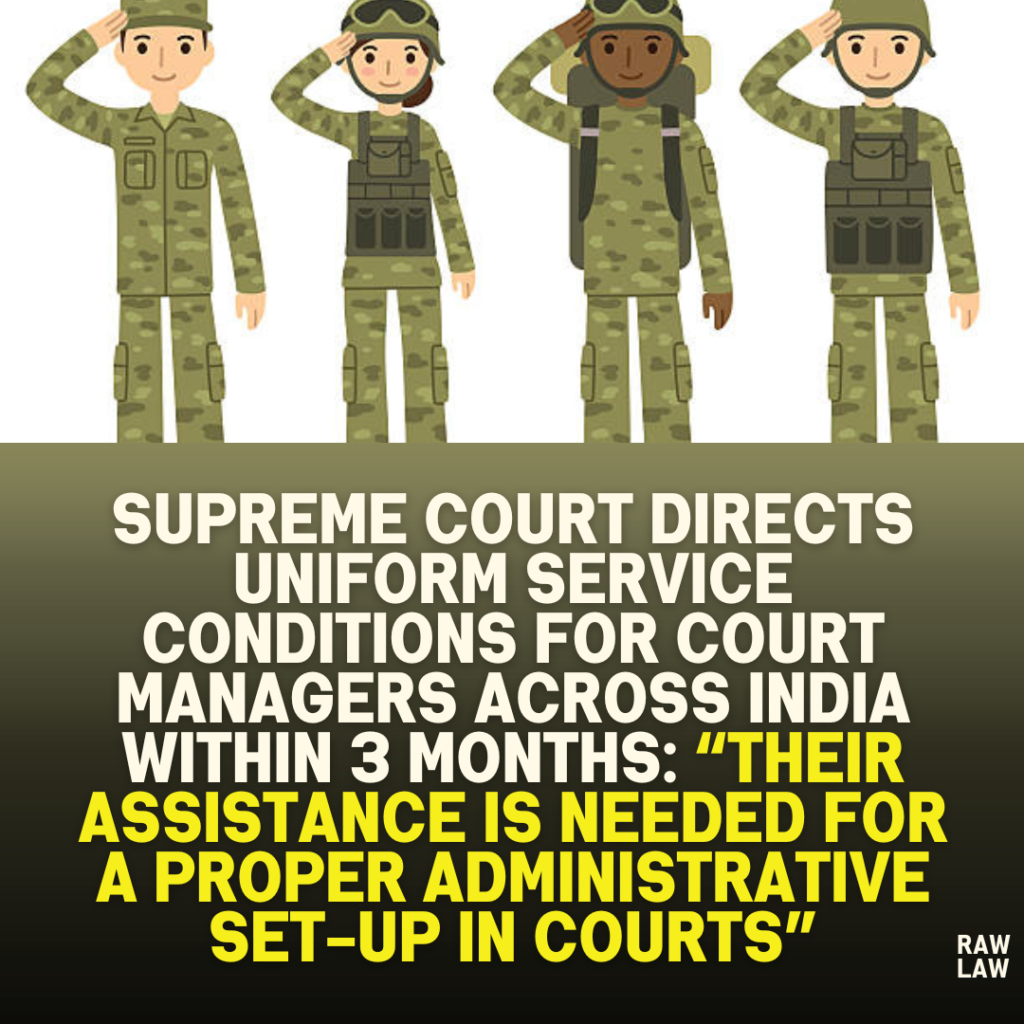Court’s Decision
The Supreme Court, in its judgment dated May 16, 2025, directed all High Courts in India to frame or amend rules relating to the recruitment and service conditions of Court Managers, using the Assam Rules of 2018 as the model. The Court mandated that:
- Rules must be framed by High Courts and submitted to respective State Governments within 3 months.
- State Governments must approve the rules within 3 further months.
- Court Managers shall be treated as Class-II Gazetted Officers.
- Those already appointed on contractual or ad hoc basis will be regularised, subject to a suitability test.
- Regularisation will be from the date of initial appointment but without arrears of differential salary.
- Promotional avenues or Assured Career Progression (ACP) schemes must be considered.
The Court emphasized that Court Managers’ assistance is crucial to judicial administration and warned against discontinuing their roles citing funding constraints.
Facts
The Court Managers’ scheme was first recommended by the Thirteenth Finance Commission (2010–2015) to improve court efficiency by supporting judges with administrative tasks. Subsequently, several High Courts engaged Court Managers, often on a contractual basis without uniformity in pay or service conditions.
Despite a direction by the Supreme Court in 2018 for their regularisation and inclusion in court infrastructure, many states failed to implement this. The Second National Judicial Pay Commission (SNJPC) in 2022 further recommended creation of regular cadres with appropriate pay and allowances. However, disparities persisted, leading to the present applications and writ petition.
Issues
Whether further directions are needed from the Supreme Court to ensure the framing and implementation of uniform rules for recruitment and service conditions of Court Managers by the High Courts and State Governments, in light of the Finance Commission recommendations, the SNJPC report, and the earlier judgment dated August 2, 2018.
Petitioner’s Arguments
- Court Managers across India remain on ad hoc or contractual terms despite working for years.
- Their service conditions lack uniformity, and they are denied promotions, allowances, and pension benefits.
- They are essential to judicial functioning, managing data, human resources, IT, and non-judicial tasks.
Respondent’s Arguments
- Some High Courts and State Governments cited financial constraints or pending approval processes.
- A few have framed rules but implementation is delayed.
- Uniform rules may not be feasible due to state-specific exigencies under Articles 229 and 309 of the Constitution.
Analysis of the Law
The Court reiterated its earlier view from the 2018 judgment that Court Managers are vital for administrative efficiency in courts. It held that failure to regularise them despite clear directives and the SNJPC’s report undermines access to justice and proper court functioning. The Assam Rules of 2018 were deemed comprehensive and suitable as a model for adoption by other states.
Precedent Analysis
In its 2018 judgment in the same matter [(2018) 17 SCC 555], the Court had directed that:
“The services of any person already working as a Court Manager in any district should be regularised by the State Government as we are of the considered view that their assistance is needed for a proper administrative set-up in a court.”
The Court relied on this precedent to reaffirm the necessity of regularisation and structuring of the Court Manager role.
Court’s Reasoning
The Court found that despite central recommendations and its own directives:
- Many High Courts and State Governments failed to frame or approve rules.
- There was arbitrary and unequal treatment of Court Managers across jurisdictions.
- A system-wide structure was required to avoid stagnation and ensure career progression.
It concluded that the Assam Rules of 2018 should be taken as the template due to their detailed provisions on pay scales, duties, regularisation, and promotional opportunities.
Conclusion
The Supreme Court disposed of the batch of IAs and the writ petition with a series of binding directions:
- High Courts must frame or amend rules within 3 months using Assam Rules as a model.
- States must approve such rules within a further 3 months.
- Court Managers are to be designated Class-II Gazetted Officers.
- Regularisation of current Court Managers must occur through a suitability test, with retrospective effect but without arrears.
- Avenues for promotion or ACP must be provided.
- Registrar Generals and Chief Secretaries are personally responsible for compliance.
- The pending LPA before the Punjab and Haryana High Court (LPA 1951/2019) must be decided in line with this judgment.
Implications
This judgment standardises the service structure for Court Managers nationwide, ensuring parity, job security, and incentivised performance. It also underscores the judiciary’s recognition of Court Managers’ pivotal role in judicial administration. By directing personal accountability of High Court and State officials, the Court ensures that its orders are not left in limbo.
This decision is expected to lead to a more structured and efficient justice delivery system across the country.




Pingback: Delhi High Court Holds Defendants Cannot Enter Witness Box Without Written Statement: “Permitting Them to Lead Evidence Would Amount to Entering from the Backdoor” - Raw Law